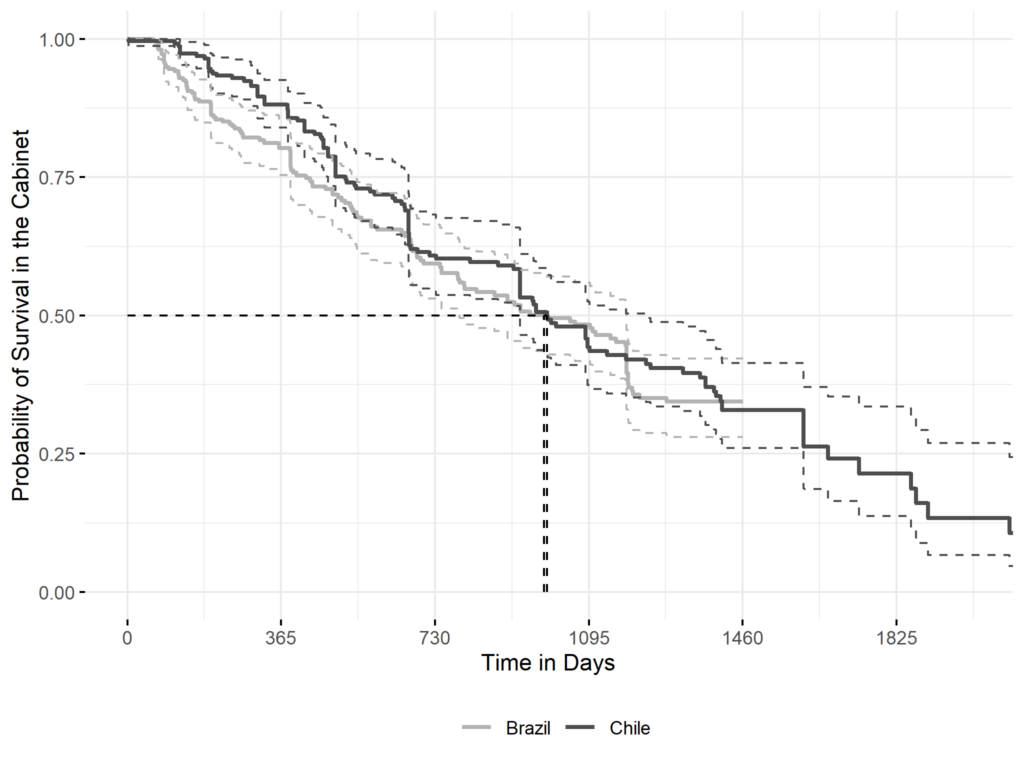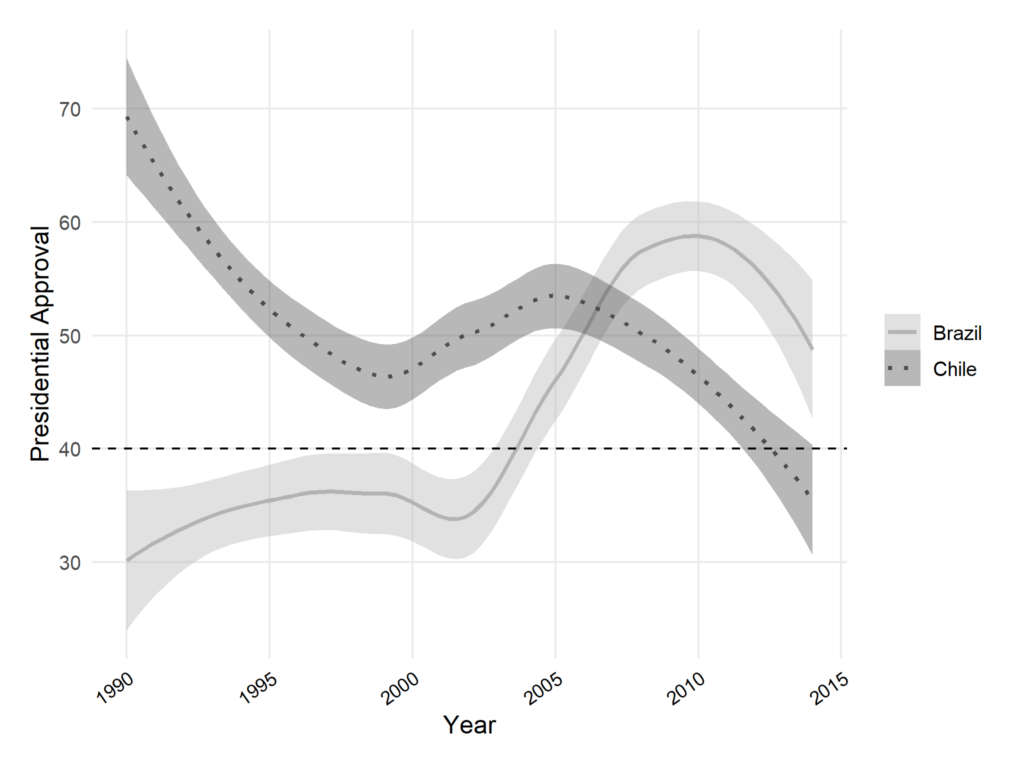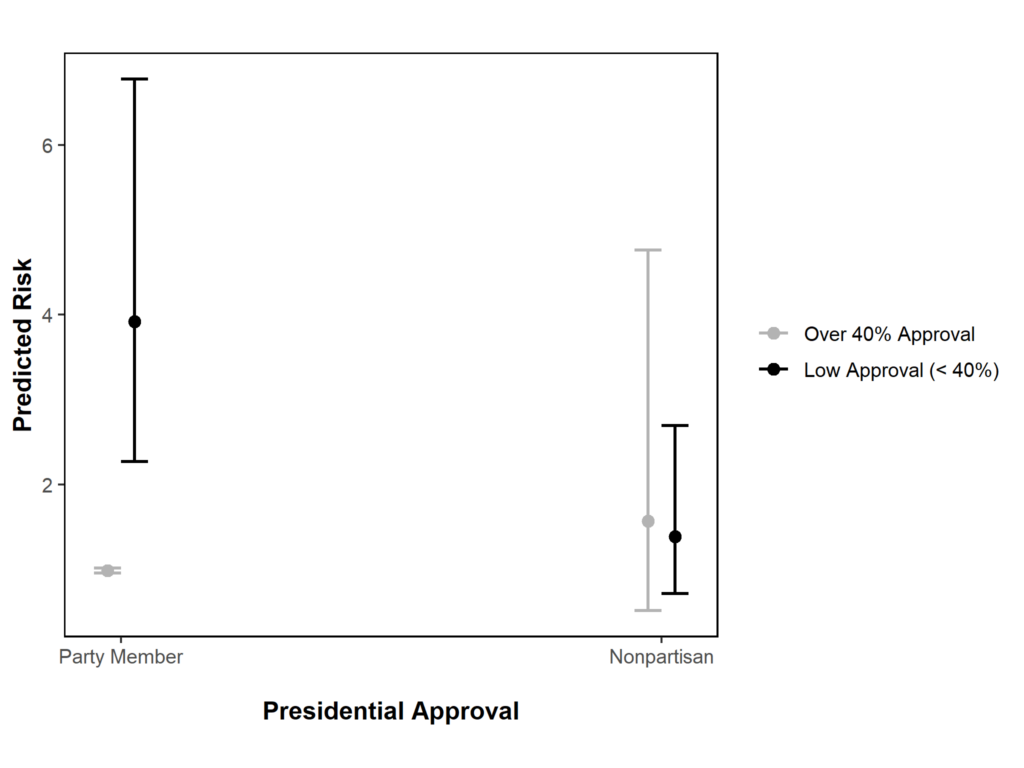Bastián González-Bustamante
How can a minister’s attributes prevent his exit from the cabinet during periods of low presidential approval? This was the central question in my article, published in The British Journal of Politics and International Relations (González-Bustamante, 2023). I examine the impact of low presidential approval on ministerial survival in Brazil and Chile between 1990 and 2014. I also used time-dependent cabinet data and combined time-varying exposure Cox regressions with propensity score and matching to estimate the effect of low approval on ministerial survival. The empirical strategy also performs moderation analysis using ministerial profiles associated with presidential strategies. This article is a proof-of-concept focused on two countries and slightly different aspects of those that I addressed during my doctoral dissertation at the University of Oxford through a more extensive cross-national comparison of the presidential systems in the region, focusing on institutional dynamics and presidential strategies from a comparative politics perspective rather than personal traits, profiles and ministerial backgrounds. In this entry, I offer insights into this proof-of-concept and perspectives for future research.
By addressing the question above, I was able to provide an empirically accessible conceptualisation of ministerial profiles connected to presidential strategies during approval crises. This approach made a theoretical contribution towards filling the gap in the general understanding of ministerial profiles. Furthermore, I introduced a specific method for accurately estimating the effects and bias using survival analysis, representing a significant and innovative methodological advancement. This contribution was relevant because straightforward modelling of the relationship between low approval ratings and cabinet reshuffles may be subject to bias and endogeneity issues, as presidents, or prime ministers in the case of parliamentary systems, often reorganise their cabinets during periods of low popularity or crises (Martínez-Gallardo, 2014).
The well-known body of literature on cabinet politics recognises that stability can be influenced by a number of events, including public demonstrations, financial downturns, scandals, or low approval (Camerlo and Pérez-Liñán, 2015; Martínez-Gallardo, 2014). However, methodologically, it is difficult to measure all potential stochastic events and random shocks that could affect governments, therefore, in this proof-of-concept, I focus on low approval times. Most studies recognise that presidents have incentives to correct drops in personal or government popularity during these periods. In this context, individual changes and reshuffling can be understood as strategies.
The patterns of presidential approval typically follow a cyclical model with quadratic characteristics: an initial honeymoon with high support, followed by a steady decline and a slight upturn towards the end of the presidential term. Research in Latin American countries corroborates this trend, showing a notable honeymoon phase during the first nine months of term, subsequently declining to a nadir of 40%-45% approval, and ultimately experiencing a modest rebound. Therefore, the first empirical expectation is that exposure to periods of low approval increases the probability of a minister being removed from the cabinet.
I refine the argument by considering how certain ministers’ characteristics and qualifications may influence or mitigate a president’s decision to dismiss them, as particular profiles are associated with identifiable presidential strategies. The focus was on examining the protective effects of the specific traits associated with these strategies. To bolster this argument, I explore various theoretical perspectives concerning ministerial selection and the concept of political career. First, research indicates that presidential cabinets tend to have fewer party affiliates than their parliamentary counterparts, and there is not necessarily a link between a party’s cabinet representation and its congressional seats. This reflects the considerable freedom presidents have in selecting their ministers, sometimes opting for nonpartisan appointments. The choice to appoint nonpartisan ministers can be viewed as a presidential tactic to mitigate moral hazard issues and reduce the risk of agency loss. This scenario can be particularly complex in multiparty systems, despite the institutional framework of presidential systems theoretically allowing the principal –in this instance, the president– to exert greater control over moral hazard in the delegation chain with their ministers. Consequently, I put forward the following empirical expectation: Nonpartisan ministers are less likely to be removed from the cabinet during periods of low approval.
Second, I assessed the importance of technical expertise as a valuable attribute for presidential cabinet members because it can assist in navigating challenging situations and advancing governmental objectives. The high level of specialisation required in specific ministries may indeed make it more challenging to replace incumbent ministers (Martínez-Gallardo, 2014). The focus is mainly on the influence of economists, given the extensive literature on technocracy in Latin America. However, recognising that not all countries have experienced a clear dominance of technocracy, especially regarding economists, I ran robustness checks to examine alternative measures of expertise. These include the technopol profile and possession of a PhD. The underlying premise is that a more technically proficient cabinet enables presidents to achieve better policy implementation outcomes and communicate effectively with the electorate, thereby maintaining or regaining popularity. Consequently, the empirical expectation is that ministers, who are economists, are less likely to be removed from the cabinet during periods of low approval.
Finally, the influence of party leaders or political capital can be viewed as a mediating element in executive-legislative relationships. I emphasise the strategic use of cabinet appointments in negotiating with parties rather than focusing on the symbolic aspect of political capital. The practice of appointing and safeguarding ministers, who are party leaders, can be seen as similar or complementary to forming coalitions to overcome legislative blockages. This approach contrasts with the strategy of minimising agency loss by appointing nonpartisan ministers close to the president. While this may increase moral hazard, it could also result in explicit legislative backing. I focus on a clear-cut definition of political capital rather than on complex sociological approaches that rely on resources and capital. While intriguing, these approaches present an overwhelming array of subcategories for politicians, technocrats and technopols, which proves to be too ambiguous for practical empirical analysis. Thus, the empirical expectation is that ministers, who are party leaders, are less likely to be removed from the cabinet during periods of low approval.
The empirical strategy combines time-varying exposure survival models, propensity score analysis and matching techniques. Several recent studies on ministerial duration and turnover have adopted this approach (Camerlo and Pérez-Liñán, 2015; Martínez-Gallardo, 2014). However, these models are not exempt from the non-random selection problem inherent to observational data. Therefore, I combine propensity score and matching estimation to correctly estimate the effect of presidential approval crises on the departure of cabinet ministers and the possible moderating effect of certain specific profiles and attributes. Initially, I combined various data sources from ministers in Brazil and Chile. Subsequently, I encoded the dataset with time-dependent variables, using quarterly intervals over the entire period. This approach allowed for the inclusion of time-varying factors such as approval ratings and macroeconomic indicators (Figure 1).
Figure 1. Kaplan-Meier Survival Estimations for Ministers and Presidential Approval in Brazil and Chile


Source: González-Bustamante (2023).
The econometric estimation and inference strategy are structured into three phases. First, observational Cox survival models were employed, followed by propensity score estimation and sample matching, to assess the effect of presidential approval accurately. Notably, a specific extension of classic Cox models with time as the dependent coefficient was utilised, which involved working with non-proportional hazards owing to the structure of the dataset. The propensity score was then calculated by regressing periods of low presidential approval against moderating covariates –ministerial profiles–, government and country fixed effects, and a number of relevant confounding variables, including the legislative effective number of parties, quadratic presidential approval pattern indicators, macroeconomic factors, among others. This facilitated the categorisation of observations into balanced groups using various algorithms, such as nearest neighbour and full matching, prior to fitting the outcome survival models. Second, an additional moderation analysis incorporated interaction terms with the ministerial profiles. Third, a number of placebo tests with high approval and robustness checks were conducted to validate the findings.
Turning to the main results and takeaways, the findings show that (1) the risk of a minister’s removal increases by 135.1% in periods of low approval; (2) nonpartisan ministers are less likely to be removed from the cabinet during periods of low presidential approval; and (3) when the president enjoys strong public support, technocrats face a lower risk of dismissal, whereas party leaders experience the opposite effect. Indeed, the main results indicate that the risk within the cabinet rises markedly compared to ordinary periods or those with high approval. In addition, ministers without party affiliation enjoy greater protection. This aligns with the expectation that appointing nonpartisan individuals may represent a presidential tactic to mitigate moral hazard and agency loss during tumultuous times (Figure 2). An alternative interpretation could be that party-affiliated ministers exit the cabinet when the government wanes in popularity. These results allow me to corroborate the first empirical expectation of low approval and that of nonpartisan ministers.
Figure 2. Predicted Risk of Presidential Approval on Individual Nonpartisan and Partisan Minister Terminations

Source: González-Bustamante (2023).
Concerning the third takeaway, placebo tests, which measured periods of high approval, revealed an ancillary finding. Technocrats, understood as economists, face a lower risk of dismissal when the president enjoys greater public support, whereas party leaders experience the opposite effect. This observation aligns with theoretical expectations, as presidents with strong backing possess increased bargaining power, thus reducing the need for influential political figures in the cabinet. However, the precise mechanism by which technocrats receive protection under these circumstances requires further investigation. In this vein, it is relevant to note that alternative measures for economists, such as PhD degrees or technopol profile, were not significant in the robustness checks.
In summary, this study provides a more comprehensive understanding of the factors influencing ministerial survival during periods of low approval and contributes to the literature on ministerial recruitment and careers. The findings provide insights into how presidents manage crises in their approval ratings and strategies to mitigate the risk of losing support. Understanding these dynamics is crucial for political scientists, policymakers, and anyone interested in the inner workings of the presidential system. In addition, the takeaways were derived from the matched sample, thus addressing imbalances and the lack of counterfactuals. Notably, the matching process facilitated adjustments of 20.6% and 52% for the main and moderating effects, respectively. This innovative methodological approach to bias correction, utilising survival analysis, emphasises the straightforward assessment of ministerial profiles. This enhances the model specification while avoiding intricate empirical measures of attributes. This methodological advancement aligns with the theoretical contribution, which offers an accessible conceptualisation of ministerial profiles rooted in presidential strategies during approval crises rather than fuzzy categories borrowed from sociology.
Future research and new avenues could draw upon strands of the stochastic events concept and focus on a variety of random shocks and crises that could affect not only cabinets but also executive power in a broader sense. Obtaining granulated data for this purpose is methodically challenging, empirically costly, and time-consuming. However, it is possible to take advantage of cutting-edge machine learning and generative artificial intelligence techniques to create novel indicators and gain insights into the differentiated dynamics and effects of these crises on executive politics and cabinet stability.

